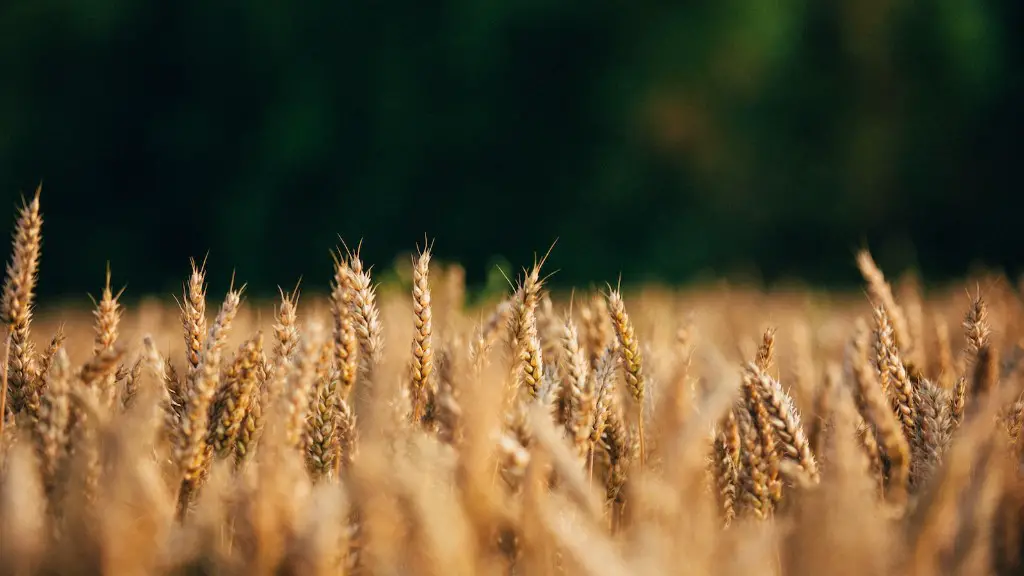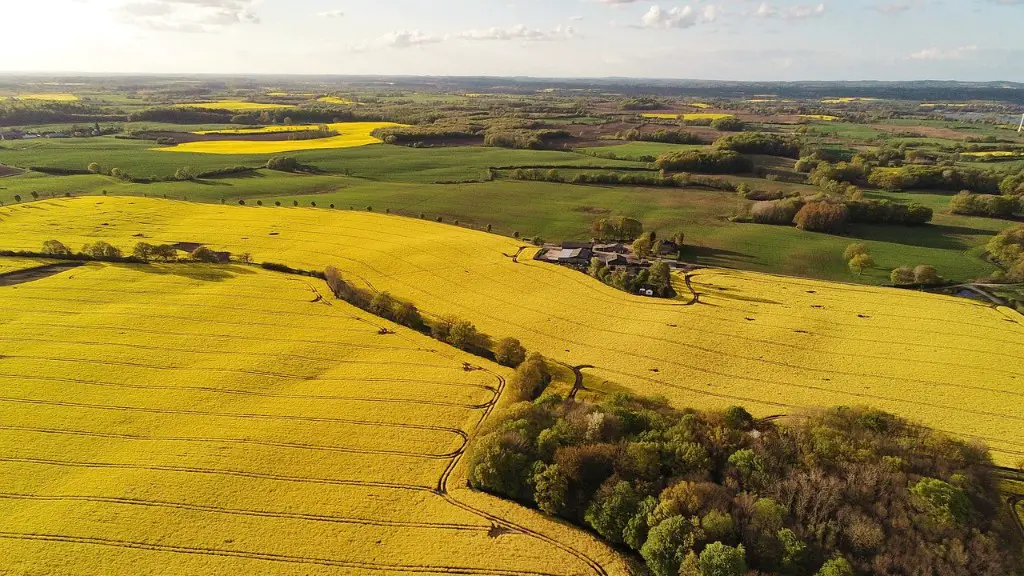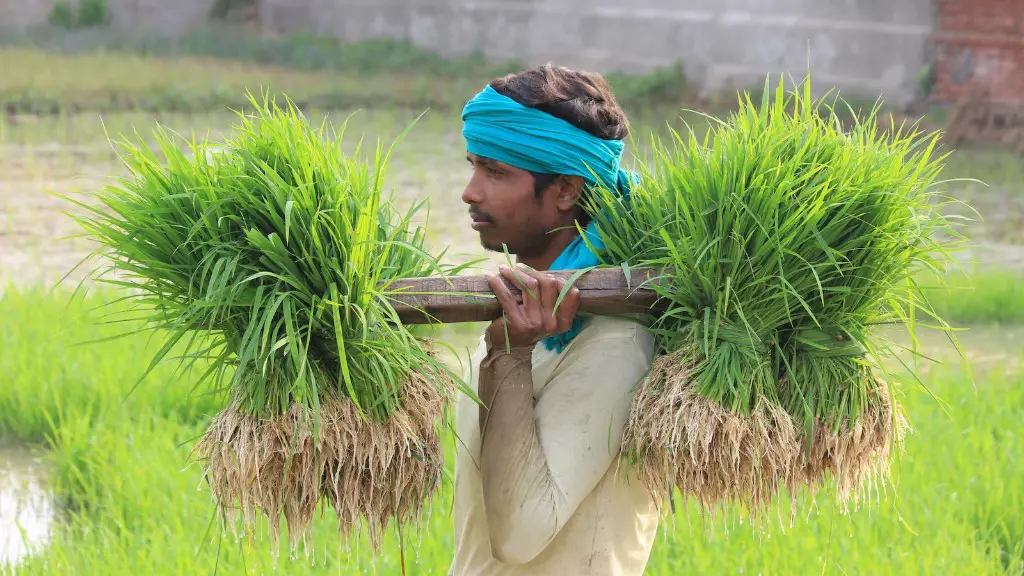Agriculture is the process of producing food, feed, fiber and other desired products by the cultivation of certain plants and the raising of domesticated animals. The practice of agriculture has been around for millennia and has played a major role in the rise of civilizations. However, it is not without its drawbacks. Agricultural production can be environmentally damaging, it can be labor intensive and it is often at the mercy of the weather.
The disadvantages of agriculture include the following:
– Agricultural production is often highly dependent on weather conditions, making it vulnerable to climate change.
– Agricultural land is often under pressure from expanding urbanization and other forms of development, leading to land degradation and deforestation.
– Agricultural activities can pollute water resources with chemical fertilizers and pesticides.
– Intensive livestock farming can create significant environmental problems, including air and water pollution and the overuse of antibiotics.
– Increased mechanization of agriculture has led to the displacement of small farmers and farm workers, as well as to social and economic problems in rural communities.
What are the advantages and disadvantages of agriculture?
There are advantages and disadvantages to having a controllable food supply. On the one hand, you might have droughts or floods, but if you’re growing the crops and breeding them to be hardier, you have a better chance of not starving. On the other hand, in order to keep feeding people as the population grows you have to radically change the environment of the planet.
Agricultural activities have led to various environmental problems. These include soil fertility loss, eutrophication of water bodies, deforestation, climate change and pesticide pollution.
Soil fertility is being lost due to the use of chemical fertilizers, which can lead to soil degradation and erosion. The overuse of pesticides has also contributed to the decline in soil fertility.
Eutrophication is the enrichment of water bodies with nutrients, which can lead to the growth of algae and other aquatic plants. This can cause oxygen depletion and the death of fish and other aquatic animals.
Deforestation is another environmental effect of agriculture. This is often caused by the clearing of land for farming purposes. Deforestation can lead to soil erosion, loss of biodiversity and climate change.
Climate change is another serious environmental problem that is being caused by agriculture. The burning of fossil fuels for farming purposes releases greenhouse gases into the atmosphere, which trap heat and lead to global warming.
Pesticide pollution is another environmental problem that is caused by the use of pesticides in agriculture. Pesticides can contaminate soil and water, and can also be harmful to human health.
What is the biggest problem in agriculture
Farmers today are facing many challenges. They must cope with climate change, soil erosion and biodiversity loss. They must also satisfy consumers’ changing tastes and expectations. They must invest in farm productivity and adopt and learn new technologies. They must also stay resilient against global economic factors.
Agriculture is a major contributor to water use and greenhouse gas emissions. Expanding agricultural land can lead to further water use and emissions. It is important to consider these impacts when making decisions about agricultural land use.
What are the negative effects of modern agriculture?
Modern agriculture has had a negative impact on the environment in a number of ways. Soil degradation, water pollution, and greenhouse gas emissions are the three main ways that modern agriculture is harming the environment.
Soil degradation is caused by a number of factors, including intensive tillage, the use of heavy machinery, and the use of synthetic fertilizers and pesticides. These activities can lead to soil compaction, loss of topsoil, and a decline in soil fertility.
Water pollution is another major problem caused by modern agriculture. Agricultural activities can lead to the contamination of water supplies with pesticides, fertilizers, and other chemicals. Animal waste can also pollute water supplies, and the overuse of irrigation can lead to water shortages.
Greenhouse gas emissions are also a major problem associated with modern agriculture. The use of fossil fuels in farming activities, including the use of tractors and other machinery, as well as the raising of livestock, emits large amounts of greenhouse gases into the atmosphere. These emissions contribute to climate change and have a negative impact on the environment.
There are a number of disadvantages to using modern farming methods. One is that they have overused the natural resource base. This has led to the loss of soil fertility and the depletion of groundwater resources. Another disadvantage is that modern farming methods require a great deal of capital. This can make it difficult for small farmers to compete and can lead to the consolidation of farms.
What are the 10 problems of agriculture?
There are many reasons to relocate to Canada today! Some of these reasons include the lack of modernization and mechanization in many parts of the world, illiteracy, ignorance, lack of funds, poor infrastructure/lack of social amenities, absence of modern storage/processing facilities, loss of land to natural disaster, and access to land and fertilizers. Canada is a developed country with a strong economy, and it offers many benefits to those who relocate here. There are many opportunities for employment, education, and a good standard of living. If you are thinking of relocating to Canada, there are many resources available to help you make the transition.
While agriculture can have positive effects on the environment, such as oxygen production and climate, it can also have negative effects, such as inorganic nitrate pollution, pesticide pollution, and salinity problems. These negative effects are especially pronounced in regions where agriculture is practiced intensively.
Why is agriculture the biggest mistake
Farming allowed for the domestication of plants and animals, which led to the development of settled civilizations and, subsequently, deep class divisions. Hunter-gatherers, by contrast, have little or no stored food and no concentrated food sources, like an orchard or a herd of cows. They live off the wild plants and animals they obtain each day. This way of life is far more egalitarian than the settled, agricultural way of life, in which a few individuals control the food supply and wield great power over others.
There are a number of reasons for the current shortages in the supply chain, including:
– The COVID-19 pandemic has disrupted global trade and transportation, leading to shortages of goods and materials.
– The rise in popularity of plant-based diets has led to increased demand for vegetables and grains, putting pressure on the supply chain.
– Droughts and other weather events have led to shortages of key crops, further exacerbating the issue.
These shortages have led to far-reaching impacts on farmers and ranchers such as making it difficult to find machinery parts and transport commodities. As a result, farm production costs have spiked, contributing to inflation.
The situation is likely to continue in the near term, but there are steps that can be taken to mitigate the impact. For example, farmers can diversify their crops and focus on producing items that are in high demand. Additionally, working together with other farmers and ranchers to pool resources and share information can help to reduce the impact of shortages.
What are at least 3 cons to our agricultural practices?
The advances in agricultural practices have definitely had an impact on productivity and food supply. However, there are also some drawbacks to these practices, including loss of biodiversity, soil and water pollution, and increased levels of greenhouse gases.
Traditional farming methods are becoming increasingly inaccessible to the greater public. This is due to urbanization, deforestation, lack of space, and water shortages around the world. These problems pose a risk to the environment and the traditional way of life.
What are 2 issues facing modern agriculture
Farmers have to contend with a lot of variables when it comes to their crops and profitability. The quality of the soil, the quality of the water, the climate, and the terrain can all impact a farmer’s bottom line. Some seasons are better than others, but ultimately it’s the farmers’ ability to adapt and adjust that will determine their long-term success.
Industrial agriculture is one of the leading causes of human-related emissions of greenhouse gases, which fuel climate change. It is also a major source of water and air pollution. The widespread use of antibiotics and pesticides in industrial agriculture has led to antibiotic resistance and pesticide toxicity.
What are the major problems in agriculture 2022?
The cost of fertilizer, crop protection, and labor are all increasing for farmers across the United States. This is causing a great deal of stress for farmers, as 80 percent of them rank rising input costs as the number-one risk to profitability. It is important for farmers to find ways to cut costs in these areas in order to remain profitable.
There are many reasons to choose organic over conventional agriculture. Organic farming has a smaller carbon footprint, does not contribute to soil erosion, conserves and builds soil health, replenishes natural ecosystems for cleaner water and air, and does not leave toxic pesticide residues. These benefits are important for the environment, but also for human health. Pesticide residues have been linked to a variety of health problems, including cancer, reproductive issues, and endocrine disruption. In contrast, organic foods have been shown to be more nutritious and even taste better. When making your food choices, remember that organic is not only better for the planet, but also for your body.
What are the disadvantages of natural farming
The disadvantages of organic farming are that organic food is more expensive, production costs are higher, and marketing and distribution is not as efficient.
The study identified four major visible impacts of climate change: occupational hazards, vector borne diseases, changing nutritional status, and inequity in development. These impacts are already being felt by people across the globe, and are likely to become more severe in the future. Climate change is a major threat to human health, and we must take action to mitigate its effects.
Conclusion
There are a few disadvantages of agriculture. The first is that farming is a very labor-intensive profession, so it can be difficult to make a good living as a farmer. Secondly, farming is often at the mercy of the weather, so a bad growing season can lead to financial difficulties. Finally, agriculture can have a negative impact on the environment, as it can lead to soil erosion and water pollution.
The disadvantages of agriculture are that it can lead to soil erosion and water pollution, and it can also require large amounts of land and labor.




